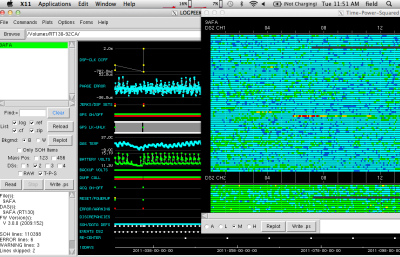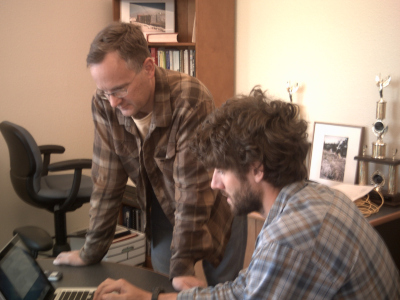Training at PASSCAL
 In addition to loaning and maintaining devices from the instrument pool, and providing vital assistance to PIs in the field, PASSCAL also trains PIs and their colleagues at our facility in Socorro, New Mexico. These training sessions can be intense, and typically last three days. The instruction is focused on the specific technical areas requested by PIs (such as data archival methods, or mastering the intricacies of specific sensors).
In addition to loaning and maintaining devices from the instrument pool, and providing vital assistance to PIs in the field, PASSCAL also trains PIs and their colleagues at our facility in Socorro, New Mexico. These training sessions can be intense, and typically last three days. The instruction is focused on the specific technical areas requested by PIs (such as data archival methods, or mastering the intricacies of specific sensors).
Training is important for both novice and well-seasoned PIs. It provides hands-on interaction with the many types of instrumentation, software, and data handling that PASSCAL supplies, as well as the opportunity to ask questions that normally wouldn't come up until the PI is deploying equipment in the field. Training at PASSCAL provides PIs with the opportunity to have their questions answered immediately by our on-site knowledgeable staff.
(Above: Engineers from the Escuela Politecnica Nacional Ecuador, Instituto Geofísico, spent the first two weeks of May 2011 training at PASSCAL.)
 |
On December 17th, 2012, both of the PASSCAL conference rooms were in use for training. Here, Pnina Miller of PASSCAL (left) demonstrates the new iPhone utilities for interfacing with RT130 digitizers to Christian Poppeliers of Augusta State University. Poppeliers is the PI for the Gradient Study experiment (201242), which includes a two-stage deployment of a small-scale, broadband array near Augusta, Georgia. |
|
During training, workstations and the projector system are often used to help principal investigators spin up on applications like PASSCAL's Logpeek program. |
 |
 |
Staff scientist and data specialist Katyliz Anderson coaches Christian Poppeliers on the use of Antelope and other software programs for archival of data at the IRIS DMC. |
|
In a second conference room down the hall, staff scientist/data specialist George Slad (left) instructs PI Brandon Schmandt, an Assistant Professor at the University of New Mexico (formerly with the Geology department at California Institute of Technology), on proper data archival methods. Schmandt is a co-PI with Rick Aster of New Mexico Tech on the GCFlood Experiment (201256), which involves seismic measurements made at the Grand Canyon during a controlled flood event in November, 2012. |
 |
To learn more about how training at PASSCAL can assist you with the performance and completion of your experiments, please contact PASSCAL passcal [at] passcal [dot] nmt [dot] edu (here).
Learn more about training at PASSCAL in this article.
- Home
- General Information
- Instrumentation
- Dataloggers
- Sensors
- All-In-One Systems
- Power Systems
- Field Procedures
- Controlled Sources
- Seismic Source Facility
- Magnetotelluric Systems at PASSCAL
- Ground Penetrating Radar
- Power and Memory Calculations Form
- Data Archiving
- Apply for a PI Account
- Experiment Scheduling
- Polar
- Important Hardware/Software Notes
- USArray
- Software

